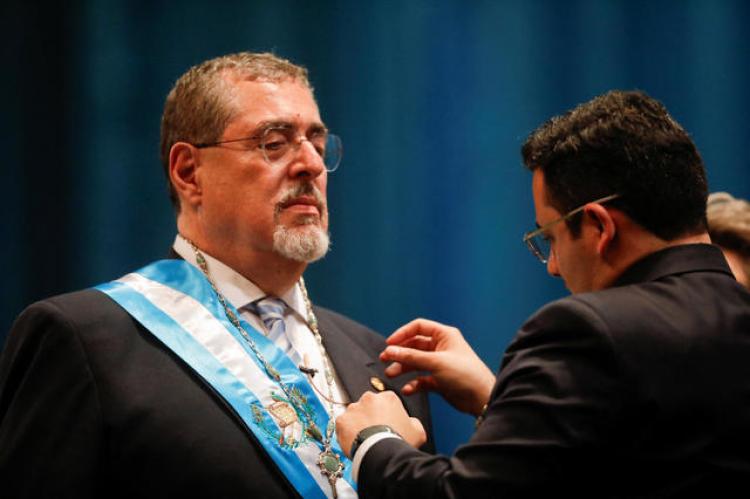"Immense Challenges Await Us: President Arévalo Embarks on Transforming Guatemala"
By: Omar Silva, National Perspective Belize (DIGITAL EDITION 2024)
Belize City Monday, 15th January 2024
In a historic dawn ceremony on Monday, social democrat Bernardo Arévalo officially assumed the presidency of Guatemala after a prolonged judicial standoff that had gripped the nation for seven months. Despite the tumultuous journey to his inauguration, Arévalo wasted no time in acknowledging that his tenure faces formidable challenges that lie ahead. Analysts have identified key obstacles that the president is set to confront as he embarks on a mission to reshape Guatemala's destiny.
Standing on the balcony of the National Palace in the heart of the capital, President Arévalo called upon all Guatemalans to join him in his efforts to rescue the nation's institutions from the grip of "corruption" and usher in a new era of social development in this Central American nation plagued by poverty.
"Today marks the commencement of a four-year mandate that will undoubtedly be marked by a series of obstacles, many of which we cannot foresee at this moment," admitted the 65-year-old sociologist, former diplomat, and philosopher. "We understand that change can be arduous," he added.
President Arévalo candidly predicted that his government would be confronted with the need to make "difficult decisions" and would grapple with "moments of doubt and fear." He emphasized that the coming years would test their ability to resist confrontation and enhance unity, acknowledging the possibility of making errors and receiving criticism along the way.
However, Arévalo remained resolute in his commitment to "transform" not only the state's institutions but also the "everyday reality" of Guatemalans. With the presidential band proudly draped across his chest, he proclaimed, "No more corruption, no more exclusion," before an exuberant crowd of supporters who celebrated and danced to the rhythm of musical groups.
One of the initial hurdles on Arévalo's path to reform is the Prosecutor's Office, which has been a central player in the battle against corruption. "The first obstacle is the Prosecutor's Office. It is vital for the attorney general, who has been the main architect of the corrupt pact, to step down," remarked Manfredo Marroquín, co-founder of Acción Ciudad, the local counterpart of Transparency International.
Attorney General Consuelo Porras, targeted by the Public Ministry's offensive to strip her of immunity and implicated in corruption and undermining democracy, presents a formidable challenge. Porras was appointed by former presidents Jimmy Morales and Alejandro Giammatti, both with ties to corrupt sectors, and the president lacks the authority to remove her from office.
Arévalo remains undeterred, vowing to tackle "monumental challenges" to eliminate deeply entrenched corrupt practices permeating all facets of Guatemalan society, from the Prosecutor's Office and courts to the parliament, government, and municipal offices.
But achieving this ambitious goal will not be without its hardships, as highlighted by Jordán Rodas, a former human rights attorney in exile: "He is going to be swimming in a swamp, among wild fauna, also injured."
Arévalo's commitment to eradicating corruption and delivering swift results in purging corrupt networks resonated with the Guatemalan population, which has grown weary of enduring corruption's scourge. Indigenous communities, seeking an end to exclusion, and a youth yearning for opportunities to curb migration, also placed their hopes in Arévalo's presidency.
"There is a very high expectation, and we must understand the limitations that the government faces," noted Jorge Santos, coordinator of the Human Rights Defenders Protection Unit in Guatemala.
As Arévalo takes office, Guatemala grapples with staggering poverty, with 60% of its 17.8 million inhabitants affected, one of the highest rates in Latin America, driving thousands to emigrate, primarily to the United States. The president faces the daunting task of governing effectively while addressing the people's demands to confront corruption and attend to their socio-economic needs.
Despite the daunting challenges ahead, Arévalo invokes the legacy of former presidents Juan José Arévalo, his father, and Jacobo Árbenz, who led a decade of important social reforms in the 1940s and 1950s known as the "democratic spring." Yet, this era was cut short by a coup sponsored by Washington.
As Bernardo Arévalo assumes the mantle of leadership in Guatemala, the nation holds its breath, hoping that this new era may indeed bring about the transformation that the people so desperately seek. The path ahead is strewn with obstacles, but the promise of a "new spring" remains a beacon of hope for a brighter future.
- Log in to post comments

